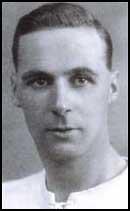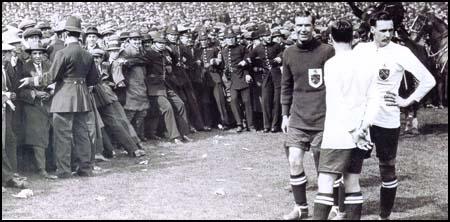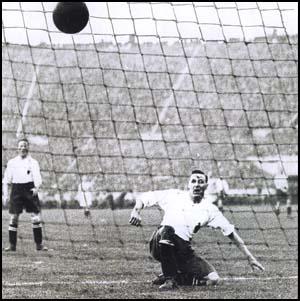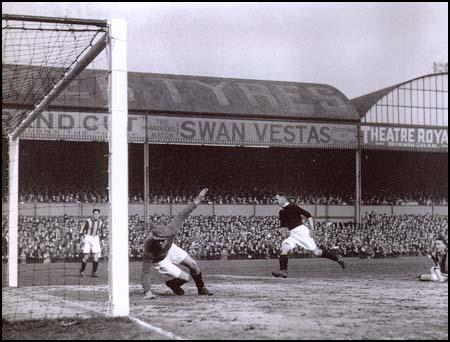David Jack

David Jack was born in Bolton on 3rd April, 1899. His father, Robert Jack, had played Alloa Athletic in Scotland before moving to England to play for Bolton Wanderers.
In 1910 Robert Jack became manager of Plymouth Argyle. After the First World War he signed his two sons, David Jack and Robert Jack. David had been playing for local side, Plymouth Presbyterians at the time.
David Jack was in great form for Plymouth Argyle and Arsenal and Chelsea both tried to sign him. After scoring 11 goals in 48 appearances, David Jack was transferred to his father's former club, Bolton Wanderers, for £3,500, in December 1920. He made his league debut against Oldham Athletic the following month and soon developed a good partnership with Joe Smith.
In the 1920-21 season Jack's goals helped Bolton Wanderers finish in 3rd place in the First Division of the Football League. However, his striking partner, Joe Smith, scored a club record of 38 goals that season.
Bolton Wanderers enjoyed a good FA Cup run in the 1922-23 season. They beat Leeds United (3-1), Huddersfield Town (1-0), Charlton Athletic (1-0) and Sheffield United (1-0) to reach the first cup final to be held at Wembley Stadium.
The Football Association had no idea that so many people wanted to see the final. It is estimated that over 240,000 people entered the ground, with another 60,000 locked outside. As the stadium had a 127,000 capacity, the crowds overflowed onto the pitch as there was no room on the terraces. When the game eventually got started, David Jack and Joe Smith scored in Bolton's 2-0 victory over West Ham United.

crowd from the pitch before the 1923 FA Cup Final.
David Jack won his first international cap for England against Wales in March, 1924. England surprisingly lost this game 2-1 but Jack retained his place against Scotland the following month. Jack failed to score in this 1-1 draw and after these two failures, he was dropped and was out of the team for the next four years.
Jack continued to do well for Bolton Wanderers and scored the only goal when the club beat Manchester City in the 1926 FA Cup Final. He was the club's top scorer for five of the eight seasons he was there, scoring 144 goals in 295 league matches. Jack also regained his place in the international side and scored in England's 5-1 win over France.

In October, 1928, Herbert Chapman, the manager of Arsenal, decided to pay a transfer fee of over £10,890 for David Jack. Sir Charles Clegg, president of the Football Association, immediately issued a statement claiming that no player in the world was worth that amount of money. Others thought that at 29 years old, Jack was past his best. However, over the next few years Jack did everything he could to show that he was worth the money. Chapman later told Bob Wall that the buying of Jack was "one of the best bargains I ever made".
Soon afterwards Chapman signed Cliff Bastin and Alex James. They joined a team that included Herbert Roberts, Eddie Hapgood, Tom Parker, Charlie Jones, Bob John, Alf Baker, Dan Lewis, George Male, Jimmy Brain, Joe Hulme and Jack Lambert.
Herbert Chapman gradually adapted the "WM" formation that he had introduced when he first came to the club. Herbert Roberts was the centre-half who stayed in the penalty area to break down opposing attacks. Chapman used his full-backs, Eddie Hapgood and Tom Parker, to mark the wingers. This job had previously been done by the wing-halves, who now concentrated on looking after the inside-forwards. Bob John and Alf Baker were the men he used in these positions. Dan Lewis was the goalkeeper in what became known as "defence-in-depth". The young George Male was often used if any of the full-backs or wing-halves were injured.
Pulling the centre-half back left a gap in midfield and so Chapman needed a link man to pick up the ball from defence and to pass it on quickly to the attackers. This was the job of Alex James, who had the ability to make accurate long low passes to goalscoring forwards like Charle Jones, David Jack, Jimmy Brain, Joe Hulme, Cliff Bastin and Jack Lambert. Chapman told the other forwards to go fast, like "flying columns" and if possible to make for goal direct.
Jack ended the 1928-29 season as the club's top scorer (25 goals in 31 games). Arsenal finished in 14th place in the 1929-30 season. They did much better in the FA Cup. Arsenal beat Birmingham City (1-0), Middlesbrough (2-0), West Ham United (3-0) and Hull City (1-0) to reach the final against Chapman's old club, Huddersfield Town. At the age of 18 years and 43 days, Cliff Bastin was the youngest player to appear in a final. Arsenal won the game 2-0 with goals from Alex James and Jack Lambert. David Jack therefore became the first player to win the FA cup at Wembley with two different clubs.

Arsenal won their first five matches in the 1930-31 season and did not lose until the tenth game. Aston Villa took a narrow lead but in November, 1930, Arsenal beat them 5-2 at Highbury with Cliff Bastin and David Jack scoring twice and Jack Lambert once. Sheffield Wednesday now went on a good run and for a while had a narrow lead over Arsenal. However, a 2-0 win over Wednesday in March took them to the top of the league. This was followed by victories over Grimsby Town (9-1) and Leicester City (7-2).
When Arsenal beat Liverpool 3-1 at Highbury they became the first southern club to win the First Division title. The Gunners won 28 games and lost only four and obtained 66 points, six more than the previous best total and seven more than their nearest rivals, Aston Villa. David Jack scored 31 goals in 35 games. Other important players in the team included Alex James, Jack Lambert, Cliff Bastin, Joe Hulme, Eddie Hapgood, Bob John, Jimmy Brain, Tom Parker, Bill Harper, Herbert Roberts, Charlie Jones, Alf Baker and George Male.
Cliff Bastin later recalled: "This Arsenal team of 1930-31 was the finest eleven I ever played in. And, without hesitation, I include in that generalization international teams as well. Never before had there been such a team put out by any club."
Arsenal began the 1931-32 season badly. West Bromwich Albion won at Highbury in the opening game and victory did not come until the fifth match, at home to Sunderland. Arsenal's main problem was a lack of goals from Jack Lambert who was suffering from an ankle injury. However, Lambert recovered his goalscoring touch and Arsenal went on a good run and gradually began to catch the leaders, Everton.
Arsenal also did well in the FA Cup. They beat Plymouth Argyle (4-2), Portsmouth (2-0), Huddersfield Town (1-0), and Manchester City (1-0) to reach the final. Arsenal's league form was also good and after the FA semi-final they were only three points behind Everton, with a game in hand. This was followed by victories over Newcastle United and Derby County and it seemed that Arsenal might win the cup and league double.
The next game was against West Ham United at Upton Park. After two minutes Jim Barrett went for a loose ball with Alex James. According to Bernard Joy: "James chased after it, both went awkwardly into the tackle and as James slipped, down came the full weight of Barrett's fifteen stone on to his outstretched leg." James had suffered serious ligament damage and was unable to play for the rest of the season. Arsenal missed their playmaker and won only one more league game and Everton won the title by two points. That season David Jack scored 21 goals in 34 league games.
Arsenal played Newcastle United in the FA Cup Final on 23rd April, 1932. The Arsenal team that day was: Frank Moss, Tom Parker, Eddie Hapgood, Charlie Jones, Herbert Roberts, George Male, Joe Hulme, David Jack, Jack Lambert, Cliff Bastin and Bob John. Arsenal scored first, eleven minutes after the start, when John headed in a centre by Hulme.
Just before half-time Jimmy Richardson chased what appeared to be a lost cause, when David Davidson sent a long ball up the right wing. When the ball appeared to bounce over the line, the Arsenal defence instictively relaxed. Richardson managed to hook the ball into the middle and Jack Allen was able to head home. Despite the protests, the referee W. P. Harper, awarded the goal. David Jack missed an easy chance midway through the second-half and soon afterwards Allen scored again to win the game for Newcastle United 2-1.
Arsenal was in great form in the 1932-33 season. They only lost two matches against West Bromwich Albion and Aston Villa in their first 18 games. A 9-2 win over Sheffield United gave the club a six-point lead at Christmas.
Arsenal played Walsall of the Third Division North in the FA Cup on 14th January 1933. Injuries and illness robbed Arsenal of several key players including Eddie Hapgood, Joe Hulme, Jack Lambert and Bob John. Four inexperienced reserves were drafted into the side. They all performed badly and so did the regular members, with David Jack missing several opportunities to score. The tackling of the Walsall players, especially on Alex James and Cliff Bastin, also caused the team serious problems. As Bernard Joy pointed out: "They (Walsall) were aided by the narrow ground which was made more cramped by the encroachment of spectators up to the touchlines."
Fifteen minutes after the interval, Gilbert Allsop headed in from a corner. Soon afterwards, Tommy Black, who was deputising for Eddie Hapgood, gave away a penalty with a blatant foul on Bill Sheppard. Walsall scored from the spot and managed to hold out for a 2-0 win. It was the greatest giant-killing result in FA Cup history.
Arsenal recovered quickly from the defeat in the FA Cup and were unbeaten in the league until March. This included a 8-0 win over Blackburn Rovers. By the end of the season Arsenal was four points in front of Aston Villa. David Jack had scored 18 goals in 34 games.
Sunderland were Arsenal's main challengers in the 1933-34 season thanks to a forward line that included Raich Carter, Patsy Gallacher, Bob Gurney and Jimmy Connor. In March 1934 Sunderland went a point ahead. However, the Gunners had games in hand and they clinched the league title with a 2-0 victory over Everton. David Jack played in only 14 games and just qualified for his third championship medal. In the five years he had been at the club he scored 113 goals in 181 league games.
In May 1934 David Jack became manager of Southend United. In 1944 he was appointed as manager of Middlesbrough.
(1944-52) and Shelbourne (1953-55).
David Jack died on 10th September, 1958.
Primary Sources
(1) Herbert Chapman, Herbert Chapman on Football (1935)
I remember David Jack making his first appearance for the Arsenal, in a match at Newcastle. For days he had been boomed as the £10,000 footballer, and a natural fear had seized him that, if he were judged by his display on that occasion, it would be decided that his value had been grossly exaggerated. He knew, too, that the players of the Arsenal expected a great deal from him. He had come to take the place of Charlie Buchan, and as the man who was to restore the fortunes of the club.
That match was a nightmare to Jack. He told me afterwards that he felt as if he had been thrown to the lions, and for some time afterwards he was rather unhappy, though properly proud of being the first player judged to be worth such a considerable fee. I doubt whether he has even got over it yet.
In a confidential talk I had with him shortly before the 1930 Cup Final, he told me how anxious he was that we should win, in order that the club might think that his fee had been justified. If we had lost at Wembley, my opinion of Jack and his value to the Arsenal would not have changed in the slightest. I should still have thought that in securing him from Bolton Wanderers I had made the best bargain of my life.
© John Simkin, March 2013
